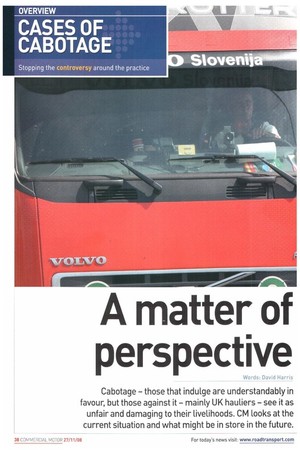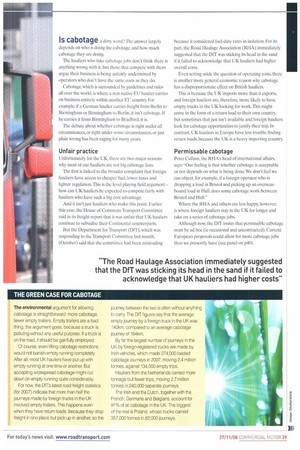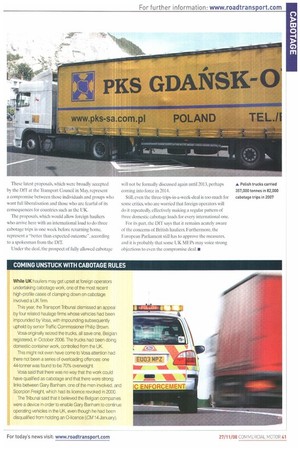A matter of perspective
Page 38

Page 39

Page 41

If you've noticed an error in this article please click here to report it so we can fix it.
Words: David Harris
Cabotage those that indulge are understandably in favour, but those against it mainly UK hauliers see it as unfair and damaging to their livelihoods. CM looks at the current situation and what might be in store in the future.
Is cabotage a dirty word? The answer largely depends on who is doing the cabot age, and how much cabotage they are doing.
The hauliers who take cabotage jobs don't think there is anything wrong with it, but those that compete with them argue their business is being unfairly undermined by operators who don't have the same costs as they do.
Cabotage, which is surrounded by guidelines and rules all over the world, is where a non-native EU haulier carries on business entirely within another EU country. For example, if a German haulier carries freight from Berlin to Birmingham or Birmingham to Berlin, it isn't cabotage. If he carries it from Birmingham to Bradford, it is.
The debate about whether cabotage is right under all circumstances, or right under sonic circumstances, or just plain wrong has been raging for many years.
Unfair practice
Unfortunately for the UK, there are two major reasons why most of our hauliers are not big cabotage fans.
The first is linked to the broader complaint that foreign hauliers have access to cheaper fuel, lower taxes and lighter regulation. This is the level playing field argument — how can UK hauliers be expected to compete fairly with hauliers who have such a big cost advantage.
And it isn't just hauliers who make this point. Earlier this year, the House of Commons Transport Committee said in its freight report that it was unfair that UK hauliers continue to subsidise their Continental counterparts.
But the Department for Transport (DM, which was responding to the Transport Committee last month, (October) said that the committee had been misleading because it considered fuel duty rates in isolation. For its part, the Road Haulage Association (RHA) immediately suggested that the DET was sticking its head in the sand if it failed to acknowledge that UK hauliers had higher overall costs.
Even setting aside the question of operating costs, there is another more general economic reason why cabotage has a disproportionate effect on British hauliers.
This is because the 13K imports more than it exports, and foreign hauliers are, therefore, more likely to have empty trucks in the UK looking for work.This might come in the form of a return load to their own country, but sometimes that just isn't available and foreign hauliers look for cabotage opportunities to justify their trip. In contrast, UK hauliers in Europe have less trouble finding return loads, because the UK is a heavy importing country.
Permissable cabotage
Peter Cullum, the RHNs head of international affairs, says: Our feeling is that whether cabotage is acceptable or not depends on what is being done. We don't feel we can object, for example, if a foreign operator who is dropping a load in Bristol and picking up an overseasbound load in Hull, does some cabotage work between Bristol and Hull."
Where the RHA and others are less happy, however, is where foreign hauliers stay in the UK for longer and take on a series of cabotage jobs.
Although no the DfT insists that permissible cabotage must be ad hoc (ie occasional and uncontracted). Current European proposals could allow for more cabotage jobs than we presently have (see panel on p40). These latest proposals, which were broadly accepted by the DfT at the Transport Council in May, represent a compromise between those individuals and groups who want full liberalisation and those who are fearful of its consequences for countries such as the UK.
The proposals, which would allow foreign hauliers who arrive here with an international load to do three cabotage trips in one week before returning home, represent a "better than expected outcome", according to a spokesman from the DIT.
Under the deal, the prospect of fully allowed cabotage will not be formally discussed again until 2013, perhaps corning into force in 2014.
Still, even the three-trips-in-a-week-deal is too much for some critics, who are worried that foreign operators will do it repeatedly, effectively making a regular pattern of three domestic cabotage loads for every international one.
For its part, the Off' says that it remains acutely aware of the concerns of British hauliers. Furthermore, the European Parliament still has to approve the measures, and it is probably that some UK MEPs may voice strong objections to even the compromise deal.•




















































































































































